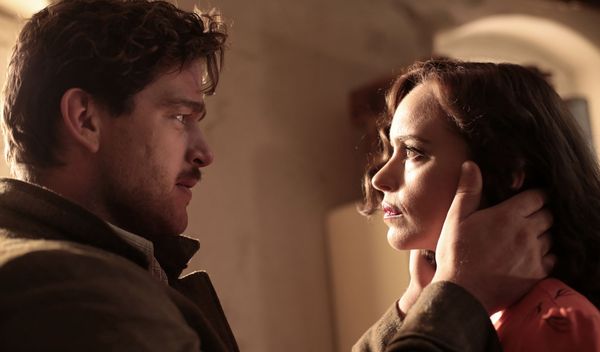Eye For Film >> Movies >> Phoenix (2014) Film Review
Phoenix
Reviewed by: Amber Wilkinson

Christian Petzold's psychological costume drama offers a twist on the doppelganger genre to explore the ideas of reconstruction and the desire for some sort of reincarnation in the aftermath of war.
His long-time collaborator Nina Hoss (Barbara, Jerichow, Yella, among others) plays Nelly, a Jewish singer who has been changed physically as well as mentally by the Second World War. Time spent in Auschwitz left her so disfigured that as we meet her she has recently undergone reconstructive surgery and is shrouded in bandages in scenes strongly redolent of Georges Franju's Eyes Without A Face. Despite being given the opportunity to change her looks entirely, she wants to return to the person she was, in stark contrast to her friend Lene (Nena Kunzendorf), who dreams of them starting a new life in Palestine.

In the face of her trauma, all Nelly wants to do is return to Berlin to find her husband Johnny (Ronald Zehrfeld). When she catches up with him at a Cabaret bar - the most literal but not only Phoenix of the film's title - that glows almost like a hell mouth in the middle of the bombed out streets, he fails to recognise her. What he does see, however, is a chance to make some cash when he realises this scrawny camp survivor bears a passing resemblance to his dead wife. He quickly hatches a plot to 'turn' this woman into his wife so that he can claim her inheritance.
Nelly - still in love with her husband - gradually starts to become her own doppelganger as she grapples with doubts over whether he, in turn, loved or betrayed her. Hoss hums with tension as Nelly, gradually revealed from beneath her bandages, she has the body language of someone who wants nothing more than to disappear, even while at the same time being desperate for Johnny to recognise her for who she really is. A broken mirror may signpost the sense of fractured self but the inner conflict displays itself in every gesture by Hoss, while Zehrfeld exhibits exactly the opposite attitude, open and dictatorial.
Petzold depicts a country in shock, where everyone is trying to rediscover a sense of self and where survival may be viewed less a miracle than something unbearable in the face of so many losses. In this, Lene proves to be as interesting as Nelly and Johnny, as she attempts to handle her own survivor's trauma. The director and co-writer Harun Farocki - adapting from Return From The Ashes by Hubert Monteilhet - keep things spare and taut, saving devastation and a fireball of emotions for last and leaving us to decide what will emerge.
Reviewed on: 23 Feb 2015
















